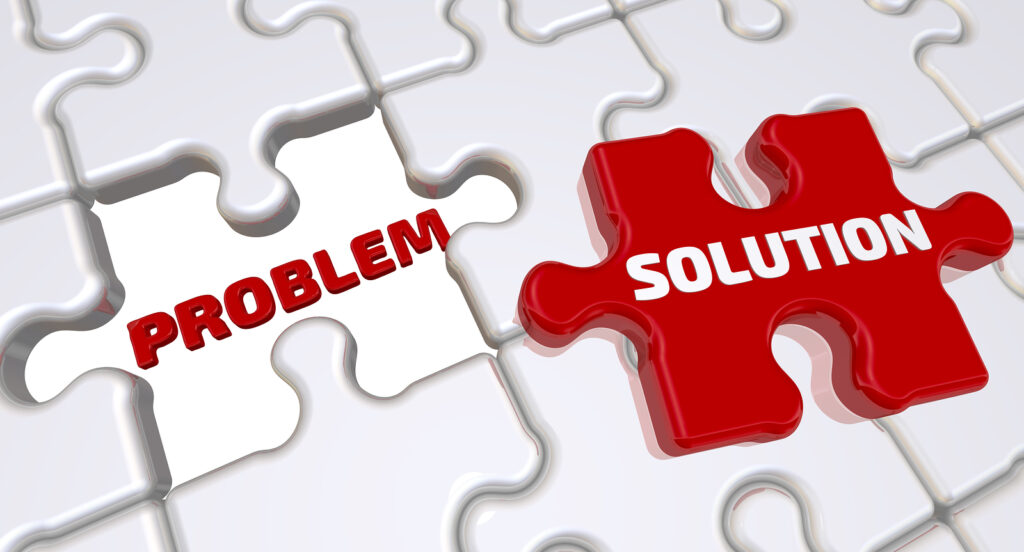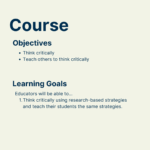You see, I used to think of myself as a reasonably smart person. I could read, write, do my taxes (mostly), and navigate a new city without getting too lost. But when it came to those tricky, messy situations that life throws at you – the unexpected work project that goes sideways, the confusing family disagreement, or even just deciding what to cook for dinner every night without feeling overwhelmed – I often found myself staring blankly, or worse, just reacting impulsively.
My desk was a graveyard of half-finished tasks, my mind a tangled knot of worries, and my problem-solving strategy was, well, mostly just hoping things would sort themselves out. Spoiler alert: they rarely did.
Then, one quiet evening, while scrolling through what felt like an endless sea of self-help articles (you know the drill), I stumbled upon something that piqued my curiosity: a "Problem Solving Course." My first thought? "Can you really teach someone how to solve problems? Isn’t that just something you’re either good at or you’re not?" But a tiny voice inside me, probably the one tired of constant stress, whispered, "What have you got to lose?"
And so, my journey began. Let me tell you, that decision was one of the best "problem-solving" solutions I ever stumbled upon, even before I knew what real problem solving was!
What Even Is Problem Solving, Anyway? (Spoiler: More Than Just ‘Finding an Answer’)
Before the course, my idea of problem solving was pretty basic: see a problem, find an answer. Simple, right? If my car broke down, the solution was "fix the car." If I had a disagreement with a friend, the solution was "apologize" or "ignore it."
But the course taught me that true problem solving isn’t just about finding an answer. It’s about finding the right answer, or more accurately, the best possible solution for a specific situation, using a structured approach. It’s a whole process, like following a recipe, rather than just guessing ingredients.
It opened my eyes to the fact that many of my "problems" weren’t really problems at all, but symptoms of something deeper. And many of my "solutions" were just temporary fixes, like putting a bandage on a gushing wound.
Stepping Stones: The Simple, Yet Powerful Things I Learned
The Problem Solving Course wasn’t about complex algorithms or mind-bending philosophy. It was about practical, step-by-step thinking that felt like someone had finally given me the instruction manual for my own brain.
Learning to See the Problem, Not Just React to It
This was perhaps the biggest revelation. We started with understanding what a problem actually is. Is it just a feeling of discomfort? Or is there a concrete issue? The course pushed me to define the problem clearly, like really, really clearly.
I remember one exercise where we had to define why a hypothetical coffee machine at work kept breaking down. My initial thought: "It’s old, buy a new one!" But the course taught me to ask "Why?" repeatedly. Why is it breaking? Because a part is failing. Why is the part failing? Because it’s overused. Why is it overused? Because too many people use it, and some aren’t cleaning it properly. Ah! Suddenly, "buy a new machine" wasn’t the only solution. Maybe we needed a cleaning schedule, or training for users, or even a second machine. This simple exercise changed how I looked at everything.
Breaking It Down: The Art of the Small Step
Big problems often feel like insurmountable mountains. You look at them, and you just want to lie down and give up. The course introduced me to the idea of breaking down a large, intimidating problem into smaller, manageable chunks.
It’s like eating an elephant (a common analogy, I know, but it works!). You can’t eat it all at once. You take one bite at a time. This technique, called decomposition, made even the most daunting tasks feel less scary. Suddenly, that huge work project wasn’t one giant beast, but a series of smaller, achievable steps. It brought a sense of control and progress that I hadn’t felt before.
Brainstorming Beyond the Obvious: Unleashing Creative Solutions
Before, my brainstorming sessions usually involved me sitting alone, thinking of three ideas, and picking the first decent one. The course introduced me to techniques for generating a truly diverse range of ideas. We learned about "divergent thinking" – just throwing every idea at the wall, no matter how wild, without judgment. Then, "convergent thinking" – sifting through those ideas to find the most promising ones.
It wasn’t just about listing solutions; it was about asking "What if?" and "Why not?" It was liberating to think outside the box, to consider perspectives I hadn’t even imagined. This part of the problem solving course really helped me see that creativity isn’t just for artists; it’s a vital tool for anyone trying to solve a puzzle.
The Power of Logic and Data (Without Being a Robot!)
Don’t worry, this wasn’t about becoming a math genius. It was about learning to use evidence and logical reasoning to evaluate those brainstormed ideas. Are my assumptions correct? What data do I have? What data do I need?
I learned to question my own biases, to look for facts rather than just relying on gut feelings (though gut feelings have their place too!). This made my decisions much stronger and less prone to "I wish I’d thought of that earlier" moments. It helped me move away from emotional reactions and towards thoughtful, informed choices.
Making a Choice: Decision-Making Without Drowning in Doubt
This was a big one for me. I often suffered from "analysis paralysis" – getting stuck because I was afraid of making the wrong decision. The course provided frameworks for weighing options, considering potential risks and benefits, and even thinking about the "best-case" and "worst-case" scenarios for each solution.
It taught me that sometimes, the "perfect" solution doesn’t exist, and the goal is to find the "optimal" or "satisfactory" one. And critically, it taught me that making a decision, even an imperfect one, is often better than making no decision at all. We also talked about how to learn from the outcomes, good or bad, to improve future decisions.
From Idea to Action: Actually Solving Something
Having a brilliant solution on paper is one thing; actually making it happen is another. The problem solving course emphasized the importance of planning for implementation. Who does what? By when? What resources are needed? How will we know if it’s working?
This focus on execution was crucial. It turned abstract ideas into concrete steps, giving me a roadmap to follow. It also taught me the importance of reviewing the results and being flexible enough to adjust the plan if things weren’t going as expected. Because, let’s face it, life rarely follows the script perfectly.
Who Needs a Problem Solving Course? (Hint: Probably You!)
After going through this experience, I honestly believe almost everyone could benefit from a good problem solving course.
- If you’re in the workplace: Whether you’re a manager, an entry-level employee, or a freelancer, problems are a daily occurrence. Learning to tackle them effectively can boost your career, make you more valuable, and reduce stress for everyone.
- If you’re a student: From academic challenges to navigating social dynamics, problem solving skills are foundational for success in school and beyond.
- If you’re dealing with personal challenges: Relationship issues, financial hurdles, health decisions – these all benefit from a clear, structured approach.
- If you just feel overwhelmed: Sometimes, the sheer volume of "things to figure out" can be paralyzing. A problem solving course gives you tools to gain control.
- If you want to feel more confident: There’s a real sense of empowerment that comes from knowing you can face an unexpected challenge and have a method to work through it.
It’s not about becoming a genius overnight. It’s about developing a set of reliable tools that you can pull out whenever a tricky situation arises, making you feel less like a victim of circumstance and more like the captain of your own ship.
My Personal Takeaway: It’s Not Magic, It’s Practice
The biggest lesson I took from that problem solving course is that problem solving isn’t some innate talent. It’s a skill. And like any skill, whether it’s playing a musical instrument or riding a bicycle, it gets better with practice.
I still encounter problems, of course. Life doesn’t stop throwing curveballs. But now, when a challenge appears, I don’t panic. I don’t feel that familiar knot of anxiety. Instead, I find myself automatically going through the steps I learned: "Okay, what exactly is the problem here? What are my options? What’s the best way forward?"
It’s become second nature, a quiet confidence that hums beneath the surface of my daily life.
Thinking About Taking a Problem Solving Course? Here’s My Advice
If my story resonates with you, and you’re considering diving into a problem solving course yourself, here’s what I’d suggest:
- Look for Practicality: Find a course that emphasizes hands-on exercises, case studies, and real-world application. Theory is good, but actually doing it is where the learning happens.
- Check the Instructor: A good instructor can make all the difference. Look for someone who is not just knowledgeable but also engaging and can explain complex ideas in simple terms.
- Don’t Expect Miracles Overnight: Remember, it’s a journey. Be patient with yourself. You won’t solve every problem perfectly right away, but you will get better.
- Apply What You Learn Immediately: The moment you learn a new technique, try it out on a small problem in your own life. The more you use it, the more it sticks.
- Don’t Be Afraid to Start: The biggest hurdle is often just taking that first step. Whether it’s an online problem solving course, a local workshop, or a book, just start somewhere.
Conclusion: The Unseen Benefits of Learning to Solve
Looking back, that problem solving course wasn’t just about learning techniques. It was about changing my mindset. It taught me to approach challenges with curiosity instead of dread, with a plan instead of just hope.
My life isn’t suddenly problem-free – whose is? But now, I navigate the twists and turns with far more grace and effectiveness. I’m less stressed, more confident, and surprisingly, even more creative. It’s like I finally got the secret map to navigate life’s inevitable mazes.
So, if you’re feeling stuck, overwhelmed, or just want to sharpen your mental tools, consider a problem solving course. It might just be the quiet revolution your mind has been waiting for. Trust me, it was for mine.



